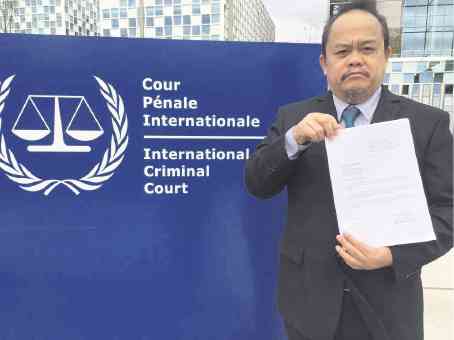Palace hopes complaint in int’l court won’t lead to an investigation
Malacañang hopes the International Criminal Court (ICC) will not listen to confessed murderers and investigate President Duterte for crimes against humanity over the thousands of killings in his war on drugs.
There is no reason for the information submitted to the ICC by lawyer Jude Josue Sabio to prosper to an investigation, presidential spokesperson Ernesto Abella told a news briefing in the Palace on Tuesday.
Sabio, a lawyer for confessed Davao Death Squad (DDS) hit men Edgar Matobato and Arturo Lascañas, asked the ICC to investigate Mr. Duterte and 11 other officials for the killings of 1,400 people in Davao during Mr. Duterte’s term as mayor of that city and for the slayings of more than 7,000 people since he launched his war on drugs after taking office as President last June.
The information relies heavily on the Senate testimonies of Matobato and Lascañas, who admitted to being members of the DDS and killing hundreds of people on orders from Mr. Duterte, who formed the hit squad when he was mayor of Davao City.
Article continues after this advertisement
Democratically elected
Article continues after this advertisement“It would really be deeply disappointing if the court took the word of admitted murderers as the basis for action against a head of state who was democratically elected by a Filipino electorate that want[ed] nothing more than an end to an epidemic that [was afflicting] millions of our countrymen and women, that [was] responsible for a crime wave that [had] been terrorizing many parts of our country for decades,” Abella said.
The submission to the ICC was just “propaganda,” he added.
For the Catholic Church, Sabio’s move gives the ICC an opportunity to take action on the violation of human rights in the Philippines.
Sorsogon Bishop Arturo Bastes said the submission of information to the court was a “very good step” toward an investigation “so that the whole world will know that crimes against humanity, seemingly sanctioned by the government, are being committed in this Christian country.”
Baste expressed hope that the submission to The Hague court would lead to a halt in extrajudicial killings in Mr. Duterte’s crackdown on illegal drugs.
“It is our hope that this move will inject fear into the hearts and minds of the accused officials so that they will eventually and sincerely put a stop to these merciless killings,” he said.
Headed for dustbin
But Sen. Panfilo Lacson, chair of the Senate committee on public order and illegal drugs, said in a text message that the information was headed for the dustbin if it was based on the testimonies of “perjured witnesses.”
Matobato and Lascañas testified to separate Senate inquiries on the DDS killings in Davao but the senators set aside their accounts for having no probative value.
Matobato’s testimony was thrown out by the justice committee headed by Sen. Richard Gordon—one of the 11 allies of Mr. Duterte sought to be investigated by the ICC—after it was learned that he had been charged for the kidnapping and murder of a Pakistani whom he had claimed was a DDS target.
Lascañas confirmed the existence of the DDS in his testimony to Gordon’s committee last October, but turned around in January and, testifying to Lacson’s committee, claimed Mr. Duterte formed the death squad and ordered the killings.
Lacson said he doubted the ICC would investigate Mr. Duterte, as the international court would take the case only if Philippine courts were unwilling or unable to prosecute the people charged for the killings.
The ICC accepts cases from individuals, nations or the United Nations Security Council.
